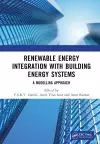
Renewable Energy Integration with Building Energy Systems
3 contributors - Hardback
£81.99
V.S.K.V. Harish is an Assistant Professor with the Department of Electrical Engineering at Netaji Subhas University of Technology (NSUT), Dwarka, New Delhi, India. He completed his ME (with Gold Medal) in Power Engineering from Jadavpur University in 2012 and his PhD from IIT Roorkee in 2017, both with an MHRD fellowship. After his PhD, he worked as a Post-Doctoral Fellow at the TERI School of Advanced Studies, New Delhi, under the Netherlands’ government-sponsored project on smart grids for rural India. He was nominated for the prestigious Young Energy Researcher Award in 2016 and in 2018 at World Sustainable Energy Days, Austria. He was awarded the Best Paper Award at the Springer and IEEE International conferences in 2019. He was granted international travel support by the Department of Science and Technology (DST), Government of India, in 2014 and 2018, and national travel support by Soft Computing Research Society (SCRS), India, in 2017. He has published several research papers in journals and conferences of international repute. He has published book chapters with CRC Press/Taylor & Francis and Springer. He is also a member of various societies and institutions, such as ASHARE, IEEE, SCRS, CIBSE, etc. His research interests include building energy systems and power systems analysis.
Amit Vilas Sant is Assistant Professor with the Department of Electrical Engineering, School of Technology, Pandit Deendayal Petroleum University, Gandhinagar. He completed his PhD at the Indian Institute of Technology Delhi, New Delhi, in 2013. Prior to this, he completed his Master of Technology in Power Apparatus and Systems (with Gold Medal) from Nirma University, Ahmedabad, in 2007. He obtained his Bachelor of Technology (Electrical and Electronics Engineering) and diploma in Electrical Engineering from Manipal Academy of Higher Education, Manipal, and The Maharaja Sayajirao University of Baroda, Vadodara. From April 2012 to September 2014, Dr. Amit was a post-doctoral researcher at the Masdar Institute of Science and Technology, Abu Dhabi. He has published several research papers in journals and conferences of international repute. Four of his research publications have received awards at different conferences. His research interests include power electronics, electric drives, electric vehicles, power quality enhancement and grid integration of renewable energy systems.
Arun Kumar has a bachelor’s in civil engineering from IIT Roorkee, a Master’s in Civil Engineering from IISc Bengaluru and a PhD from IIT Roorkee. He did Hydropower diploma studies at NTH, Trondheim, Norway. Prof. Kumar is currently working as a Professor at the Department of Hydro and Renewable Energy (HRED), IIT Roorkee. He held MNRE Chair Professor from 2013 to 2018, headed the department from 1998 to 2011, and served on the board of NHPC Ltd, Government of India PSU during 2015– 2019 as independent director. His research areas are hydropower development, environmental management of water bodies, energy economics and policy. Prof. Arun Kumar regularly teaches various postgraduate/ undergraduate courses at HRED, and students of other departments of the institute. He has designed two M.Tech programmes at HRED: Alternate Hydro Energy Systems and Environmental Management of Rivers and Lakes. He has also designed three optional courses for undergraduate students. He has contributed significantly to the establishment of the national and international recognition of the Department of Hydro and Renewable Energy. He has conceptualized and established national facilities for hydropower simulation, performance evaluation of hydro projects, hydraulic turbines, standards for SHP and environmental management of lakes and rivers, and comprehensive use of solar energy at the IIT Roorkee campus. Prof. Kumar has over 39 years of experience in the fields of hydropower and the environmental management of rivers and lakes. He served CLA for Hydropower on SRREN for IPCC. He appraises project proposals for the Government of India regularly. Prof. Kumar has received various awards and recognitions from CBIP, the Institution of Engineers, and the Hydropower Association.